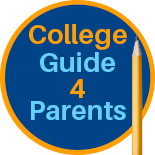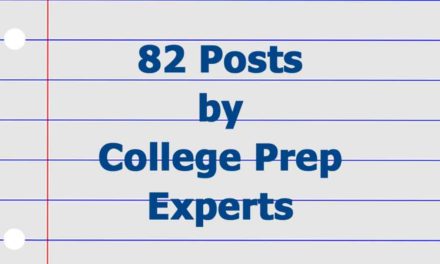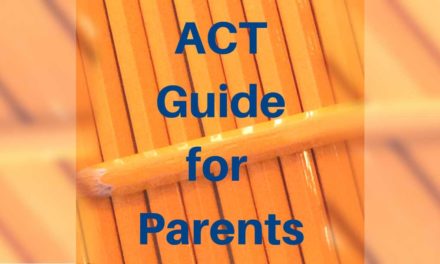This issue of College Guide 4 Parents’ College Application Newsinforms parents of high school students about college app topics relevant to this time of the year.
This month, seniors applying to Regular Decision and Rolling Admissions are busy working on their applications and making sure colleges get their best test scores.
In this newsletter, we focus on:
- what is a good ACT score
- how to get good letters of recommendation
- whatseniors should beworking on this month,
- what to record about your child’s extracurricular activities
1. WHAT IS A GOOD ACT SCORE?
The ACT consists of 4 sections each graded on 36: English, Math, Reading, and Science.The composite score is computed by taking the average of all four.
For many high schoolers taking the ACT and getting a good score represent a stressful challenge. In reality, most colleges do not expect super high scores. Indeed, while students accepted in ivy league schools typically have at least a 32, many state collegestake scores in the mid-twenties. The table below shows the range of scores obtained by the mid-50% of students at three colleges.
| College Name |
Range of scores obtained by the mid-50% of the students accepted |
| Harvard University | 32 – 35 |
| University of Illinois at Urbana Champaign | 26 – 32 |
| Louisiana State University Alexandria | 17 – 23 |
Table 1. ACT scores obtained by the mid-50% of the students accepted
(Source: CollegeSimply.com)
On the table’s second row, you can see that at the University of Illinois 25% of the students accepted typically get less than 26 on their ACT, another 25% gets at least a 32, and the remaining, the mid-50%, gets between 26 and 32.
Therefore, looking at the scores obtained by the mid-50% will help you find the schools where your child has a realistic chanceto be accepted. CollegeSimply has a tool that allows you to do just that (see online resources below).
Related online resources:
Good ACT scores for college admission by ThoughtCo
This post looks at what ACT score a student should get to be accepted by top private universities, top liberal arts colleges, and top public universities.
The best colleges for 22 on the ACT by CollegeSimply
CollegeSimply.com offers a tool that takes an ACT score, i.e. 22 and returns a list of schools that typically accept freshmen with that score. Also, this tool can take the name of a school and return the range of ACT scores obtained by the mid-50% of freshmen they typically accept.
2. ALL ABOUT GETTING LETTERS OF RECOMMENDATION
As part of the college application process, seniors must get several letters of recommendation. Admission officers use these and the essay to learn about a student’s character and to decide whether she/he would be a good addition to their school.It is therefore crucial to ask letters from persons who know your child well and who will be able to highlight his/her qualities.
Steps to obtain good letters of recommendation
(Guidelines by CollegeVine and DIY College Rankings, see below for links to their articles)
- students should ask for the letters early and in person
Since many seniors will need letters, teachers will get numerous requests, maybe more than they are willing to work on. By asking early and in person students increase their chances to get a positive answer. Asking in person is more polite and will allow the teacher to make recommendations if she/he decides not to write the letter.
- once they have secured referees, students must keep up with their progress
With online applications like the Common App, students can see whether a letter has been submitted or whether the referee is currently working on it. It may happen that a referee forgets or is unable to work on a letter. Also a student may not have the ability to know whether the teacher is working on it. In these cases, she/he should email the referee a few weeks after making the original request and ask politely about progress.
- students should provide quickly any additional information the referee might request
Teachers may ask for additional information like a resume or a list of extracurricular activities. Therefore, your senior should check his/her email daily so as not to miss any messages she/he may get from them. It is also critical to promptly provide the data they ask for. Teachers have many letters to write. If they do not receive the information they need quickly, they may switch to someone else’s letter and put your child’s request on the back burner.
- Students should thank their referees
Lastly, once the referee has submitted the letter, make sure that your child thanks him/her if possible with a greeting card.
Related online resources:
How to get the best recommendation letter by CollegeVine
This posts provides insights into how to choose the right teachers to write your child’s letters of recommendation and how to ask them.
This post emphasizes the need to start asking for letters early and to carefully review each school’s requirements as these vary from college to college.
3. COLLEGE APP – WHAT TO DO THIS MONTH
Seniors applying for Regular Decision
Depending on the college, deadlines for Regular Decisionspan from early January to early February. This month, seniors working towards these dates are wrapping up their applications. If your child is in this situation, do make sure that the colleges she/he selected receive her/his referees’ letters of recommendation and her/his highest ACT score before the deadline.
If your child would like to take the ACT a last time before her/his application deadlines, the next test date is February, 9.
Students applying for Rolling Admissions
Those applying for Rolling Admissionshave a little more time to put their applications together and may not have started yet. Entering data in an online college application takes time and planning. The good news is that your child does not need to do it all in one sitting. The student can work on a section, save the work done, and come back to it later. See our October issuefor a description of a typical college application.
4. FEATURE OF THE MONTH: Documenting your child’s extracurricular activities
The “Feature of the Month” addresses topics of interest to parents of freshmen, sophomores, and juniors. In thelast two issues ofCollege Guide 4 Parents’ College Application News, the focus was volunteering and how participating in extracurricular activities will help your child write impactful college essays.
Today we will look at what you and your child need to record about each of her/his activities to be ready when comes the time to open these college apps.
How to report activities on a college application
College applications typically include a section for applicants to describe their extracurricular activities as well as include awards and distinction they have received. The image below is a screenshot of the Common App Activities section. It shows the level of details your child will need to be able to provide for each of her/his activities.
What qualities admissions officers are looking for
Understanding what admissions officers are looking for when they review an application will help you and your child better record her/his activities. It will also give you some insights into which extracurricular activities to choose.
Admissions officers are looking for applicants who will positively contribute to their college community. More specifically they are interested in students who have, during their high school years, demonstrated the following qualities:
-
- competence
- effectiveness
- high energy level
- adventurous nature
- responsibility
- curiosity
- perseverance
- cooperation
- sustained commitment
- maturity
- character
- passion
- and focus
(source: Huffington Post, see related online resources below)
This may seem too demanding, but students participating in extracurricular activities get to run for leadership positions for a club, become their sport’s team captain, volunteer, or enter competitions. These experiences will give your child many opportunities to learn new skills, work as a team, and discover new interests and passions.
Another thing to keep in mind when selecting activities is that it is better to be involved in a few activities for several years than in a dozen each lasting just a few months.
How to record each type of extracurricular activities
The table below is a quick reference for what needs to be documented about each of your child’s activities.
| Activity Type |
What to record |
Examples |
|---|---|---|
| School Sports |
Year(s) your child was involved in that sport. Information aboutmedals she/he received including name, location, and date of competition Details aboutleadership position held in the team Whether your child lettered in her/his sport |
Cross Country: Swimming: Leadership position: |
| School Clubs |
Year(s) your child was involved in that activity For a leadership position For volunteering For a competition
|
Leadership position: Volunteering: Competition:
|
| Volunteering |
Record the names of the organization or event your child volunteered for, the dates she/he volunteered, the number of hours, and a description of the tasksperformed
|
Fall cleanup
|
| Job Shadowing |
Record the name of the organizationyour child shadowed at and if necessary the name of the person she/he shadowed (in case, for instance, of a doctor), the date and the number of hours
|
Springfield Orthodontics |
| Job |
Record the employer’s name, the period worked, how many hours per week, and the job responsibilities
|
Harps
|
| Camps |
Record the camp’s name, dates, and location. Include also a description.
|
University of Arkansas Summer Music Camp, Fayetteville, AR
|
| Boy/Girl Scout |
Record information about the leadership position(s) held within the troop: title, dates it was held, and responsibilities Record information about volunteering opportunities: the names of the organizations or events your child volunteered for, the dates she/he volunteered, the number of hours, and a description of the task |
Leadership position:
Volunteering:
|
Table 2. What to record about each type of extracurricular activities
Related online resources:
What college admissions look for in extracurricular activities by Huffington Post
Huffington Post explains how colleges use your child’s extracurricular activities to understand how she/he spent her/his time outside of school and to decide whether she/he would be a good addition to their school community. It also provides a list of the qualities they are looking for.
Complete list of extracurricular activities: 100s of examples by PrepScholar
PrepScholar provides an extensive list of activities your child can get involved in as well as advice on how she/he can narrow down which ones would be best for her/him.
Hospital volunteer opportunities for high school students: a guide by PrepScholar
PrepScholar discusses why and how to become a volunteer in a hospital
What is community service by PrepScholar
This article discusses the benefits of getting involved in community service and how to find community service project.
Complete guide: job shadowing for high school students by PrepScholar
This post explains what job shadowing is, its benefits, and how to find shadowing opportunities.
5. PREVIOUS COLLEGE GUIDE 4 PARENTS’ APPLICATION NEWS AND RELATED POSTS
October 2018 College App News – ACT Superstore, Sending Scores, College Essays
Topics : ACT scores vs. superscores, test-flexible schools, how to send scores, and how starting extracurricular activities as early as 9th grade will help when writing college essays
September 2018 College App News – PSAT, ACT, Early Action, Early Decision
Topics: 2018 PSAT test, taking the ACT in the fall, and volunteering before senior year
2018-19 College Essay Advice: 82 Posts by College Prep Experts
This article contains links to 82 posts about writing this year’s college essays, like the Common Application, Coalition Application and ApplyTexas essay prompts, and the application and supplemental essays for 62 popular colleges including several ivy league schools, the universities of New York and California, and Texas A&M.
6. REQUEST FOR COMMENTS
If this information were of help to you or if there are topics you would like me to address, please leave a comment.





